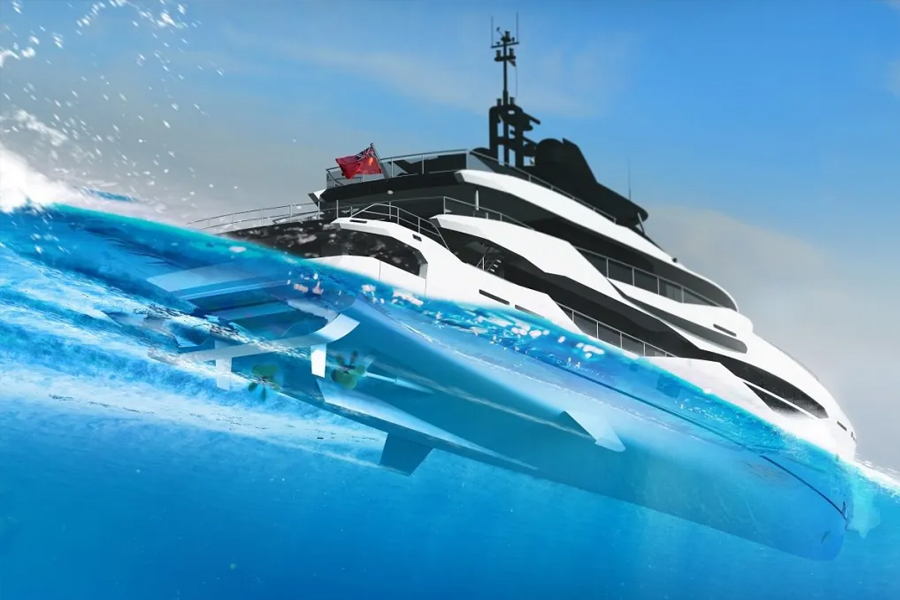 alt="Sustainability: Motor Yacht Builders – Sunseeker"/>
alt="Sustainability: Motor Yacht Builders – Sunseeker"/>
Sunseeker has collaborated with Rolls-Royce to offer MTU’s first series-production hybrid propulsion system on its two largest Superyacht designs, the 50M Ocean and 42M Ocean, which are among the shipyard’s new generation of superyachts.
MTU’s integrated hybrid system for the 50M Ocean includes onboard generators, electric propulsion modules, transmission system, batteries, and control and monitoring systems, and can be expanded on a modular basis. It offers six operating modes from all-electric for silent, emission-free cruising, through to use of the twin 12-cylinder MTU Series 2000 diesel engines.
Modes include the automated ‘smart hybrid’ and ‘charge hybrid’ that enable all power sources to be used as required. In ‘electric’, propulsion and on-board power can be supplied by the generators, optimising fuel consumption and comfort for long and overnight passages up to 10.2 knots. ‘Silent’ uses power solely from the batteries, offering nearly three hours of propulsion or seven hours of on board power in silent anchoring mode, with no emissions.

Van Oossanen has designed a Fast Displacement Hull Form for the 50M Ocean
Sunseeker and MTU UK – which have worked together for two decades – laid the basis for the hybrid propulsion system back in 2010, with tests carried out on a prototype yacht. Sales Director Sean Robertson, who has worked Sunseeker since 1986, says: “The way owners are using their boats continues to evolve. Efficiency and noise reduction are now as important as features and volume.”
For the 50M Ocean, which will be built in metal by ICON Yachts, the yard worked with Van Oossanen Naval Architects on an innovative Fast Displacement Hull Form (FDHF). The hybrid hull’s slenderness and special form produces a very low wave profile over the full speed range and was ranked by the Wolfson Unit as the most efficient in its database, a lofty accolade considering the UK-based firm has carried out towing tank tests on about 1,200 hull forms since 1968.
Sunseeker says the FDHF concept improves the efficiency of a vessel by 15-20 per cent compared to conventional displacement and semi-displacement hull forms, representing a significant reduction in consumption, emissions and operating costs.

Graphic of the MTU hybrid system for Sunseeker
The FDHF is also offered with Hull Vane® technology. Positioned below the stern, the patented fixed-foil, fuel-saving device influences the stern wave pattern, creating a forward-orientated lifting force that lowers the pitch motion and running trim. The combined effect of the FDHF fitted with the Hull Vane reduces fuel consumption by up to 30 per cent in total, according to Sunseeker.
Furthermore, the yard has been working with technical partners to ensure solutions are in place to implement selective catalytic reduction (SCR) on its larger superyachts to drastically reduce harmful emissions.
However, the bulk of Sunseeker’s production is across its Manhattan (52-68), Predator (50-74), Sport Yacht (65-74) and Yacht (76-100) ranges, and although its history is steeped in fast, high-performance boats, there’s increasing demand for efficiency and other factors from new owners.

Sunseeker’s new models include the Manhattan 68
Douglas Culverwell, Sunseeker’s Regional Business Manager for Asia, says: “Sunseeker has always offered a diverse product range, both in type – compare the Predator and Yacht lines, for instance – and performance. However, performance is increasingly being used to describe attributes other than speed and agility. Now, quietness, lack of vibration, fuel economy and reduced emissions are also a measure of performance.”
Its hull designs vary between model ranges, from out-and-out dynamic performance – witness the 62-knot Hawk 38 unleashed in 2019 – to long-range cruising and everything in-between.
“Hull design is of paramount importance to us and over the decades we’ve developed and refined an easily driven, soft-riding, deep-V hull design,” Culverwell said. “In certain models, this is optimised to offer lower resistance at lower cruising speeds, while other models focus on higher planing speeds.
“However, Sunseeker has also designed and developed semi-displacement and displacement hull forms that offer even greater endurance and efficiency with less power than their smaller stablemates. The 42M Ocean and 50M Ocean were designed with this firmly in mind.”